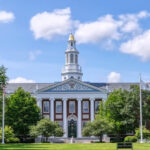Green Grads in Maryland
In a coordinated move by state and Federal officials and advocacy non-profits, Maryland may soon hold preeminent status as the most environmentally friendly state in the nation.
State officials are currently promoting a plan “that would make environmental education a requirement for all students who graduate from the state’s public high schools.” If approved this fall, Maryland would be the first state to require an “environmental literacy” component for high school graduation, said Donald A Baugh, vice president for education at the Chesapeake Bay Foundation.
The environmental literacy proposal grew out of a task force called the Maryland Partnership for Children in Nature formed by Governor O’Malley that includes a section called the “Children’s Right to Nature.”
“With today’s children spending an average of six hours a day in front of a television or computer,” they “deserve the right” . . . “to catch a fish, camp under the stars, follow a trail and play and learn outdoors in countless other ways,” noted the governor.
Rather than mandating that students take a particular course in order to graduate, Maryland school districts plan to “ensure that environmental literacy is ‘threaded through’ the curriculum,” said state superintendent Nancy S. Grasnick, a supporter of the measure.
These actions are all part of a national move to update the “No Child Left Behind Act” with an environmental component and rename it the “No Child Left Inside Act.” Legislation currently pending in Congress includes providing funding in the amount of $500 million to “promote the integration of environmental education across core subject areas.”
That possibility inspires outrage from people like Myron Ebell, director of energy and global warming policy at the Competitive Enterprise Institute who recently told CNSNews.com that “the bill officially puts propaganda in the schools,” since “urban populations . . . can be misled to believe humans are destroying the environment and that it should be preserved at all costs.”
As noted by Governor O’Malley, however, the overall objective is simply for students to gain skills that will increase their value in our increasingly green economy “and prepare them to join a workforce that will require environmental literacy.”
Other state officials agree. “We have an obligation to make sure that we equip our next generation with the tools they’re going to need . . . to, quite frankly, clean up the messes that we’ve made,” said Kevin M. Maxwell, superintendent of Maryland’s Anne Arundel Public Schools, adding that the goal is “to make sure the Earth is a sustainable home for the people who inhabit it.”
Accuracy in Academia has previously noted that environmental literacy requirements have already been inserted into higher education curricula as another way of preaching the doctrine of manmade global warming. Some colleges and universities now receive “green certifications” for their compliance.
The organization spearheading this nationwide movement aimed at students is the Alliance for Climate Education (ACE) described by former Campus Report staff writer Bethany Stotts in a recent article called “ACE Climate Propaganda.”
As of May 2010, “ACE claims to have reached over 400,000 students at 850 schools through their free high school assemblies,” wrote Stotts. On their web page, an ACE video presenter “encourages students to become ‘climate heroes’crusading against global warming,” explaining that the past ten years have been the hottest on record, a statistic that has been disproved by much of the scientific community.
Now that so many colleges and universities require environmental literacy for graduation, ACE is targeting the next tier, namely high schools, for their propaganda push. In fact, the Association for the Advancement of Sustainability in Higher Education (AASHE) mentioned that both Newsweek and Time magazines featured articles on “campus sustainability in their back-to-school higher education special reports.”
The Time article noted that “on a growing number of campuses, sustainability ‘is becoming a driving force in institutions’ missions, a guiding principle of campus operations and an academic discipline in its own right.’”
Deborah Lambert writes the Squeaky Chalk column for Accuracy in Academia.
If you would like to comment on this article, e-mail contact@academia.org.




